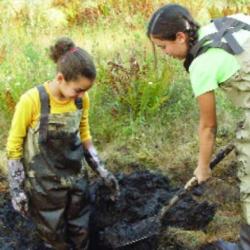Source Institutions
Source Institutions
Add to list Go to activity
Activity link broken? See if it's at the internet archive

This activity (page 2 of the PDF under SciGirls Activity: Bogs) is a full inquiry investigation into decomposition. Groups of learners will carefully observe and record the appearance of items, such as an apple, that can decompose, taking weights, measurements, and noting other physical markings. The items are then buried in buckets of various earth materials for at least two weeks. Learners will then dig up the objects to inspect, record observations to compare with their previous notes, and graph changes over time. Relates to linked video, DragonflyTV GPS: Bogs.
- 5 to 10 minutes
- 1 to 4 weeks
- $10 - $20 per group of students
- Ages 8 - 14
- Activity, Experiment/Lab Activity, Field Trip
- English
Quick Guide
Materials List (per group of students)
- four buckets, 5-gallon size, with lids
- sand, about 5 gallons
- sphagnum moss, about 5 gallons
- black dirt or compost, about 5 gallons
- water
- items that can decompose: for example, apples, cotton cloth swatches, leather swatches, chunks of uncooked meat, a chicken bone
- kitchen scale
- optional: latex gloves [Note: non- latex gloves are available for individuals with latex allergy.]
Subjects
-
Earth and Space Science
-
Earth Processes
- Geochemical Cycles
-
Earth Structure
- Rocks and Minerals
- Oceans and Water
- Biosphere
-
Earth's History
- Geologic Time
-
Earth Processes
-
Life Sciences
- Cells
-
Diversity of Life
- Plants
-
Ecology
- Energy Flow and Chemical Cycles
-
Physical Sciences
- Chemistry
-
Structure and Properties of Matter
- Mass and Weight
-
Mathematics
-
Data Analysis and Probability
- Data Analysis
- Data Collection
- Data Representation
-
Measurement
- Rate
-
Data Analysis and Probability
-
The Nature of Science
-
The Scientific Process
- About Inquiry
- Asking Questions
- Conducting Investigations
- Gathering Data
- Formulating Explanations
- Communicating Results
-
The Scientific Process
Informal Categories
- Food and Cooking
- Nature and Environment
- Outdoor Activity
Audience
To use this activity, learners need to:
- see
- see color
- read
- be mobile
- smell
- touch
Learning styles supported:
- Involves teamwork and communication skills
- Involves hands-on or lab activities
Culture, ethnicity, and gender
-
Girls
- Highlights STEM opportunities for this group
- Identifies role models or mentors in STEM fields from this group
- Uses inclusive images of people from this group
Other
Components that are part of this resource:
This resource is part of:
Access Rights:
- Free access
By:
Source Collection
- DragonflyTV
Rights:
- All rights reserved, Twin Cities Public Television, Inc., 2006
Funding Source:
- National Science Foundation, 436260
